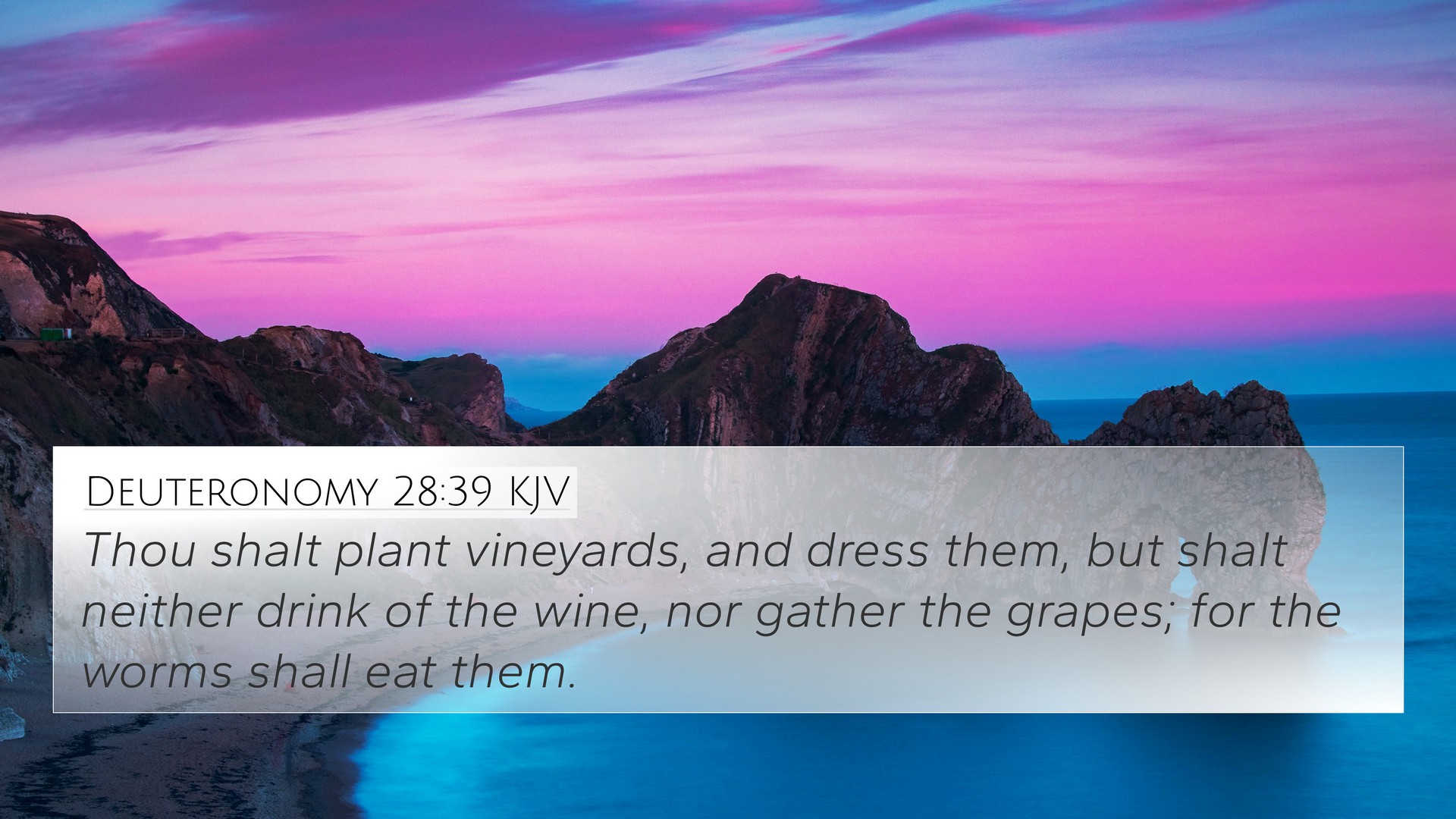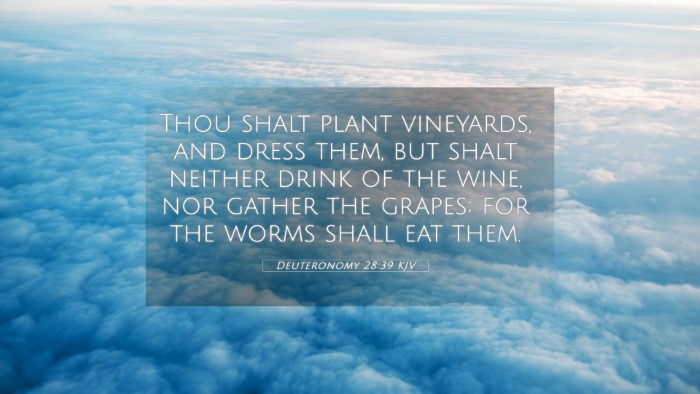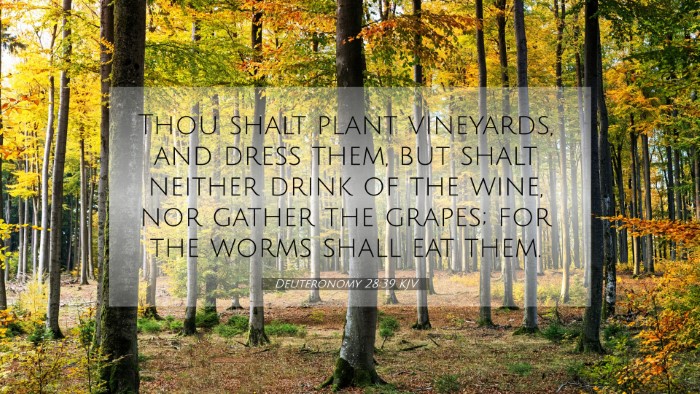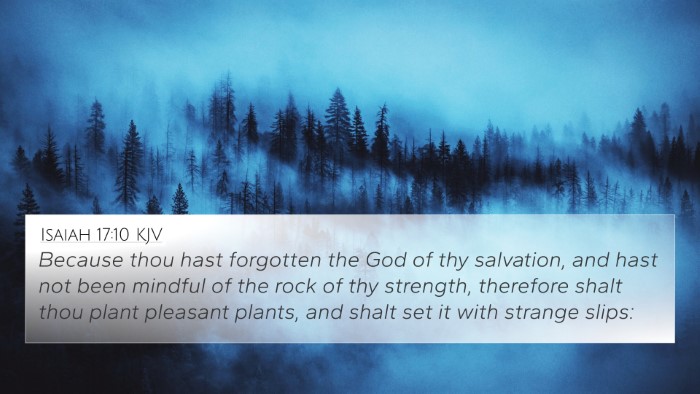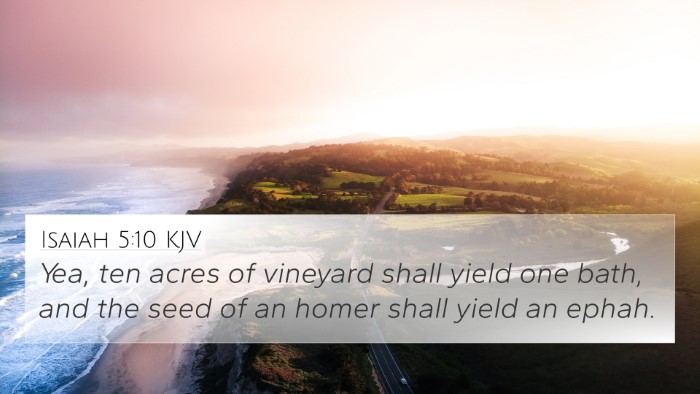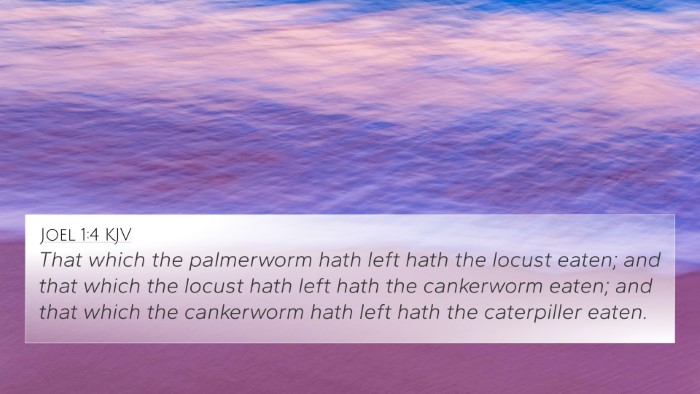Meaning and Interpretation of Deuteronomy 28:39
Bible Verse: “And you shall plant vineyards, and dress them, but you shall neither drink of the wine, nor gather the grapes; for the worms shall eat them.” (Deuteronomy 28:39)
This verse is part of a larger discourse from Moses, detailing the blessings and curses that would befall the people of Israel based on their obedience or disobedience to God's commandments. In Deuteronomy 28, there are stark contrasts between rewarding outcomes for fidelity and punishing results for infidelity.
Contextual Overview
Deuteronomy 28 is often viewed as a covenant chapter delineating the consequences of Israel's choices. The emphasis on agricultural loss signifies divine judgment upon a people who turn away from God's laws.
Insights from Public Domain Commentaries
-
Matthew Henry:
Henry highlights the disastrous impact of disobedience through practical and tangible losses. The vineyards, a symbol of prosperity, become meaningless, with all labor producing merely loss. It serves as a reminder that while Israel may work the land, without God’s blessing, their efforts will come to naught.
-
Albert Barnes:
Barnes remarks on the futility that results from divine punishment; the mention of worms provides a vivid illustration of decay and consumption. He stresses that this is part of God’s disciplinary plan and serves as a strong warning for the people to adhere to their covenant with God.
-
Adam Clarke:
Clarke elaborates on the idea that Israel’s sins would cause their scientific advancements in agriculture to yield no results. He identifies the refusal to partake in the fruits of labor as not just a physical deprivation but a spiritual lesson about the consequences of turning away from God's ways.
Thematic Connections and Cross-References
This verse connects with several other scriptural passages, emphasizing the themes of obedience, divine justice, and the metaphor of agricultural prosperity as related to spiritual fidelity.
- Leviticus 26:16: Highlights the punishment for disobedience, drawing a parallel to the agricultural aspects of hardship.
- Deuteronomy 28:15: Sets the opposite stage by outlining the curses, providing context for the benedictions promised for obedience.
- Isaiah 5:5: Illustrates the destruction of God’s vineyard, which resonates with the fate of the unfaithful in Deuteronomy.
- Joel 1:10: Discusses the devastation of crops, an echo of the consequences found in Deuteronomy 28:39.
- Hosea 8:7: Proclaims the futility of planting without God’s blessing, reinforcing the message of labor in vain.
- Galatians 6:7: Expounds on the principle of reaping what one sows, drawing a moral equivalence to the obedience/disobedience dichotomy.
- John 15:2: Talks about pruning to bear fruit, juxtaposed with the destruction of unfruitful efforts in Deuteronomy.
Lessons and Applications
From Deuteronomy 28:39, several key lessons emerge:
- The Importance of Obedience: The passage underscores the need for adherence to God’s commands, serving as a stark reminder that blessings are intertwined with obedience.
- Value of Labor: It emphasizes that labor without God’s favor yields no fruit, highlighting how spiritual and practical aspects of life are interconnected.
- Consequences of Sin: It paints a somber picture of the repercussions of ignoring God’s laws, which remain relevant throughout the ages.
Comparative Study of Related Scriptures
In performing a comparative Bible verse analysis, one should consider how Deuteronomy 28:39 interacts with both Old and New Testament texts. Cross-referencing these, one sees a consistent biblical theme of watching for the consequences of one's actions.
Tools for Bible Cross-Referencing
To further explore these connections, one may utilize various tools:
- Bible Concordance: A valuable resource for identifying words and their occurrences across the scriptures.
- Bible Cross-Reference Guide: Helps in finding verses that relate to specific themes or ideas.
- Bible Chain References: Provides a systematic approach to follow concepts throughout the Bible.
Final Thoughts
Deuteronomy 28:39 serves as a poignant reminder of the gravity of spiritual neglect. The intricate parallels, connections, and insights gleaned from public domain commentaries reflect a deep spiritual truth: faithfulness to God evokes His blessings, while disobedience breeds desolation. For those seeking understanding and meaning within scripture, exploring interconnected themes through cross-referencing offers a rich tapestry of biblical truths.
